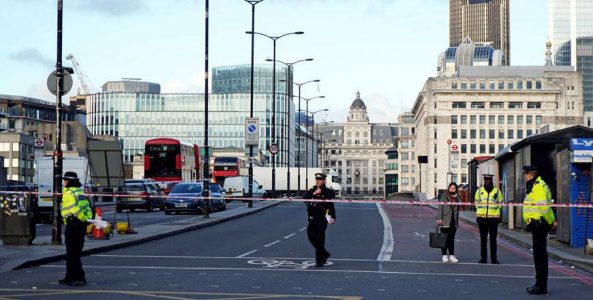
Terrorists could be released from jail without licence conditions under sentencing shake-up
Terrorists could be freed on to the streets without licence conditions under the Government’s new sentencing plans, its adviser on terror laws has warned.
Jonathan Hall, the Government’s independent adviser on terrorism legislation, said any attempt to impose licence conditions on terrorists released after serving a full-term sentence would “almost certainly be unlawful”.
It means the Ministry of Justice (MoJ) will have to consider using alternative counter-terror orders which could prove expensive and will be open to legal challenge, according to senior lawyers.
Boris Johnson has also refused to rule out suspending Britain’s support for the European Convention on Human Rights (ECHR) to keep convicted terrorists behind bars.
Mr Hall’s assessment follows Government plans to end automatic early release for all prisoners convicted of terrorist offences including those already jailed.
Rather than being released halfway through their sentences, terrorists will face a review by a specialist parole board at the two thirds point to decide if they remain a danger to the public. Those judged a risk will remain in jail for the rest of their sentence.
The Ministry of Justice (MoJ) aims to introduce a bill enacting the changes this week and wants it approved by Parliament by the end of next week.
It is a race to beat a deadline of March 7 when Mohammed Khilji, a teenager jailed for sharing graphic videos of soldiers being beheaded is due to be released half way through a five-year term.
He would be the first released since the Government’s proposed crackdown after Sudesh Amman’s terror attack in Streatham on Sunday, just 10 days after his early release from jail.
Mr Hall said the Government’s changes could create a “cliff edge” where it was unable to impose licence conditions on a terrorist about to be freed.
“If the parole board decides not to release the individual before the expiry of their sentence, will the Government be content for that individual to be at liberty without any licence or will it also add an additional licence period?” he said.
If it added a licence period which was breached requiring the terrorist to be recalled to prison “that would almost certainly be unlawful because it would be an obvious increase to the penalty,” he said.
Robert Buckland, the Justice Secretary, has pledged the “most robust safeguards” to protect the public and is considering a lighter-touch version of TPIMs, court-ordered restrictions on terror suspects’ travel, overnight residence, communications and contacts.
Home Office figures, however, show TPIMs can cost £200,000 a year per suspect and Lord Pannick, one of Britain’s leading human rights lawyers, said they would be open to legal challenge.
“In principle, it’s lawful to impose TPIMs but the individual concerned is entitled to some form of judicial process to challenge the imposition of such restrictions,” he said. Legal bills for TPIMs have reached £1 million a year.
Lord Pannick, however, said the Government’s plans to retrospectively abolish early release for jailed terrorists was “in my view lawful.”
If a challenge were successful, the Government could apply for a “derogation” from the ECHR on the basis that there is a “time of emergency” that represents a “threat to the life of the nation.”
Asked if the Government would derogate from the ECHR, the Prime Minister’s spokesman said: “We are going to ensure that we will bring forward the necessary legislation to protect the public because that’s the right thing to do.”
Amman had been on the radar of the authorities for the last decade. Social services first became involved in 2010, when he was 11-years-old, amid concerns over his school attendance, the Telegraph can reveal.
By the time he was 16 his Harrow Council were helping the family amid concerns he was fighting at school and he was offered mental health support as part of a “child in need” plan.
Before his 18th birthday he was sentenced to two youth referral orders for possessing cannabis and an offensive weapon and was under the supervision of the youth offending team. He was serving these referral orders when he committed the offences for which he was jailed.
Amman’s father yesterday revealed he had spoken to him a day before the attack, saying he recited the Koran to him, although insisting he knew nothing of his Islamist leanings. “He would never talk to me about naughty things,” he said.
A Government source said: “This Conservative Government’s priority is keeping the public safe and we have absolutely no fear of any legal challenge that may be brought to any of the huge and urgent changes we are making to keep dangerous terrorists behind bars for longer.”
Source: Telegraph





